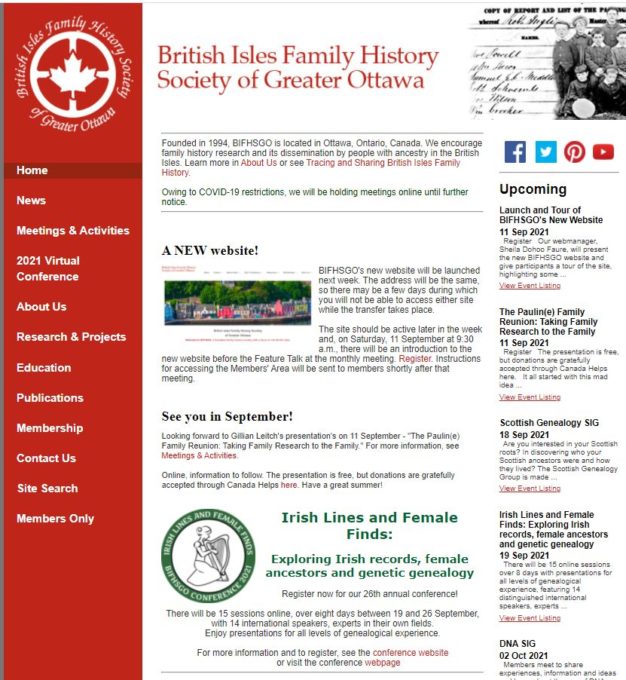 An old friend is gone. Like us all, it wasn’t perfect. We learnt to live with imperfections and valued what the old BIFHSGO website offered. Like good friends it offered a lot.
An old friend is gone. Like us all, it wasn’t perfect. We learnt to live with imperfections and valued what the old BIFHSGO website offered. Like good friends it offered a lot.
Below, the new site with its colourful image of a row of houses grabs your attention. You need to explore around to find out where items you knew where to find previously now reside.
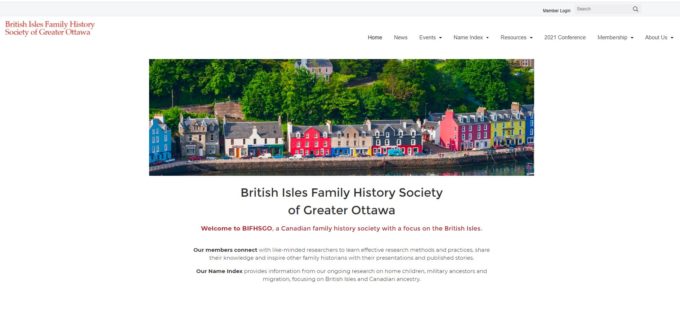
There’s an issue with the way the menu bar, the second one down, is structured for a regular or laptop computer. It’s like a person standing with arms akimbo, reaching out well beyond the body, leaving white space on either side and meaning the text in the main body is too small – for those of us whose vision isn’t what it used to be. You can enlarge the text, but then have to scroll down, for me that was five screens worth, to see the rest of the front page.
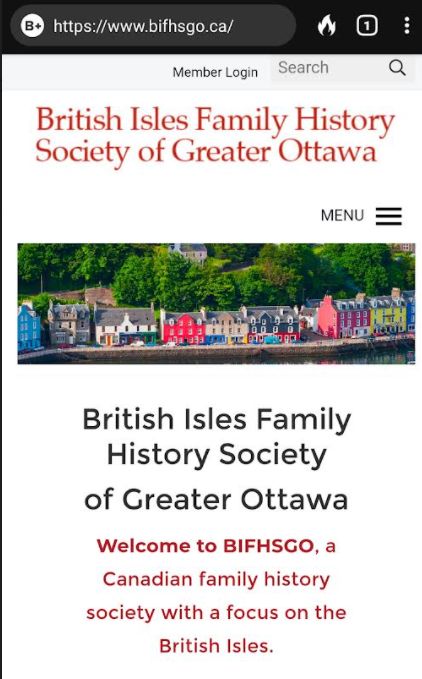 That wasn’t an issue for viewing on a smartphone, but the reformatting for the smaller screen meant “British Isles Family History Society of Greater Ottawa” appearing twice and grabbing too much of the small screen. As with smartphones, you need to scroll down more to see all the front page content, nearly 8 screens, something you get accustomed to as you can scroll more easily on the small screen.
That wasn’t an issue for viewing on a smartphone, but the reformatting for the smaller screen meant “British Isles Family History Society of Greater Ottawa” appearing twice and grabbing too much of the small screen. As with smartphones, you need to scroll down more to see all the front page content, nearly 8 screens, something you get accustomed to as you can scroll more easily on the small screen.
What about content? The site can’t be just a pretty face! Five of the eight top menu items are drop-down showing further options.
Under News, you find BIFHSGO News and News from the Genealogy World. The latter appears to be part of an effort to reach out more broadly. I doubt a Connecticut Society of Genealogists event would have been noted previously. Is that a signal about BIFHSGO’s ambitions?
Name Index provides a way to search a consolidated database of BIFHSGO’s individual databases. It’s not yet quite as advertised; it doesn’t include the Ottawa Sharpshooters.
There is a nice collection under Resources: guides, a library list, online resource links and the archive of Anglo-Celtic Roots. It notes that over the next few years, BIFHSGO will move to keep the most recent five years of the journal available only to members. Earlier issues will be available to the public in the “Shared ACR Journals” tab. Issues had previously become open access after one year. One thing lost on the present site is a page with the contents for all issues back to Vol 1 No 1 which could be searched. My wish list goes beyond that, making the corpus of ACR back issues full-test word searchable.
There’s a link to the separate 2021 Conference page.
Under Membership find out about Becoming a Member, Renew Your Membership, Donations and, Members’ Area. I delayed writing this post until information on the new access credentials for members was made available. Once the new sign-in was completed, it went smoothly as per the email received, I was able to access the last two years of Anglo-Celtic Roots, conference and monthly meeting material as far back in some cases as 2011, a few exchange journals and information on volunteer opportunities for members.
An issue with pdfs, in which Anglo-Celtic Roots and much of the other material is presented, is reading it on a small screen. Not an issue just for BIFHSGO, as smartphone use increases, and the Society encourages members to receive its quarterly chronicle online, it is something the Society will inevitably have to address.
Overall, the site has the potential to become our new old friend.


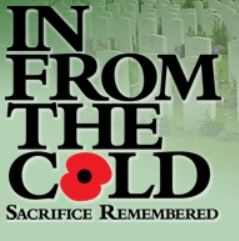 This post is delayed.
This post is delayed.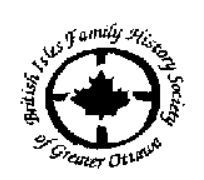 First, I hope you enjoyed Sunday’s three presentations on the first day of the BIFHSGO conference as much as I did. I’m glad there’s a chance to view them again as some of the information came quickly.
First, I hope you enjoyed Sunday’s three presentations on the first day of the BIFHSGO conference as much as I did. I’m glad there’s a chance to view them again as some of the information came quickly.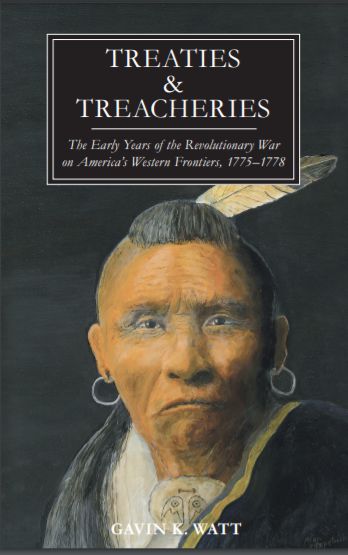 Global Heritage Press has just released the latest book from Gavin K Watts.
Global Heritage Press has just released the latest book from Gavin K Watts.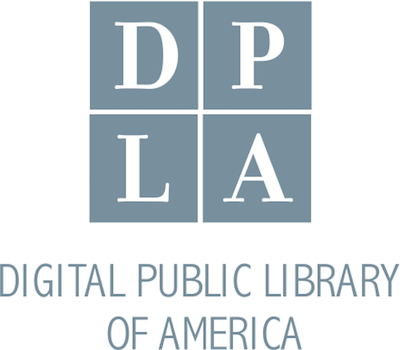 On Tuesday 19 October at 3 pm ET, The Digital Public Library of America invites you to “Join us for a one-hour informational genealogy webinar using DPLA resources, presented by the Outreach and Accessibility working group and Allison Ryall, Genealogy Specialist for the Orange County Library System. The webinar will cover some DPLA basics, such as search techniques and a metadata overview, as well as genealogy tips and tricks. Allison will provide several case studies using DPLA resources and highlighting how to navigate DPLA’s collection and use available primary source sets. Attendees will become familiar with the various DPLA resources that are relevant to genealogy research and will gain insight in genealogical search strategies.”
On Tuesday 19 October at 3 pm ET, The Digital Public Library of America invites you to “Join us for a one-hour informational genealogy webinar using DPLA resources, presented by the Outreach and Accessibility working group and Allison Ryall, Genealogy Specialist for the Orange County Library System. The webinar will cover some DPLA basics, such as search techniques and a metadata overview, as well as genealogy tips and tricks. Allison will provide several case studies using DPLA resources and highlighting how to navigate DPLA’s collection and use available primary source sets. Attendees will become familiar with the various DPLA resources that are relevant to genealogy research and will gain insight in genealogical search strategies.”
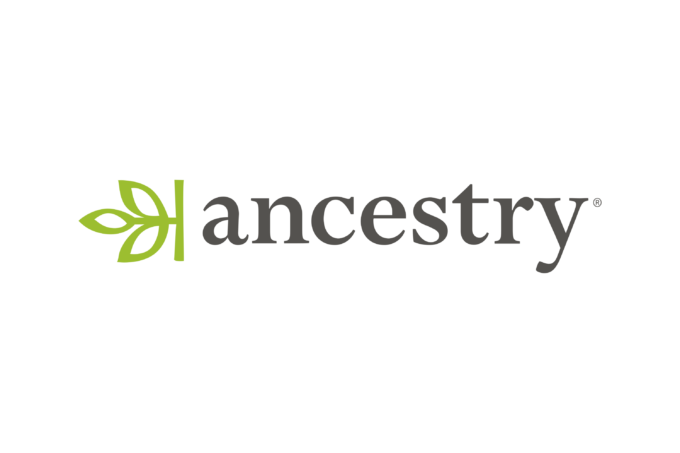 Ancestry®, has named former Amazon and Facebook executives to its leadership team.
Ancestry®, has named former Amazon and Facebook executives to its leadership team. An old friend is gone. Like us all, it wasn’t perfect. We learnt to live with imperfections and valued what the old BIFHSGO website offered. Like good friends it offered a lot.
An old friend is gone. Like us all, it wasn’t perfect. We learnt to live with imperfections and valued what the old BIFHSGO website offered. Like good friends it offered a lot.
 That wasn’t an issue for viewing on a smartphone, but the reformatting for the smaller screen meant “British Isles Family History Society of Greater Ottawa” appearing twice and grabbing too much of the small screen. As with smartphones, you need to scroll down more to see all the front page content, nearly 8 screens, something you get accustomed to as you can scroll more easily on the small screen.
That wasn’t an issue for viewing on a smartphone, but the reformatting for the smaller screen meant “British Isles Family History Society of Greater Ottawa” appearing twice and grabbing too much of the small screen. As with smartphones, you need to scroll down more to see all the front page content, nearly 8 screens, something you get accustomed to as you can scroll more easily on the small screen.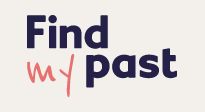 You could fit these islands 13 times into Prince Edward Island, and more than twice into Ontario’s Prince Edward County. Some organizations have difficulty distinguishing PEI and PEC, but not the smaller islands that yield this week’s additions to Findmypast:
You could fit these islands 13 times into Prince Edward Island, and more than twice into Ontario’s Prince Edward County. Some organizations have difficulty distinguishing PEI and PEC, but not the smaller islands that yield this week’s additions to Findmypast: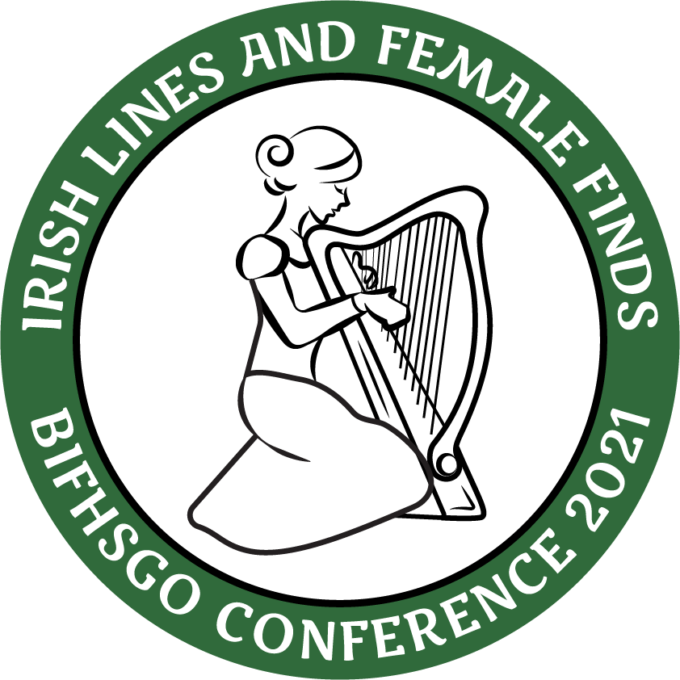 Aside from reading my popular Sunday Sundries column?
Aside from reading my popular Sunday Sundries column?